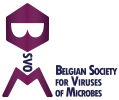Workshop Workshop on personalized phage therapy: from lab to the patient - REGISTRATION CLOSED

After the previous successful editions, BSVoM organizes the 3rd ‘Workshop on Personalized phage therapy: from lab to the patient’ coordinated by Dr. Jean-Paul Pirnay, Dr. Maya Merabishvilli and Dr. Tea Glonti. An exciting blend of theoretical sessions and laboratory experiences focused on techniques to isolate, characterize, and produce therapeutically relevant phages will be offered. An excellent opportunity to learn from the scientists behind the magistral phage therapy applied in Belgium.
REGISTRATION IS CLOSED
Target audience: The workshop is open for all phage enthusiasts but particularly targets the younger generations of phage researchers (BSc/MSc/PhD students will be given priority)
Maximum number of participants: 10
Registration deadline: November 14, 2024
Course inspiration & description
In the era of global antimicrobial resistance crisis, phage therapy, the therapeutic use of bacterial viruses (bacteriophages or phages), is increasingly put forward as an additional tool to treat resistant bacterial infections. It is important to timely select therapeutic phages. Adequate phages exhibit a stable lytic activity, without early emergence of phage resistant bacterial mutants. If the lytic activity of a phage is insufficient to be considered for therapy, it can be adapted or “trained” to become more effective against the patient’s infecting bacterial strain. When used in combination with other phages and/or antibacterial agents such as antibiotics, it is warranted that the overall antimicrobial effect should be as potent (additive effect) or more potent (synergistic effect) than if phage(s) and antibiotics were applied singly.
Methods for phage isolation, selection, lytic activity and host range determination, and phage training are therefore indispensable for maximizing phage therapy outcomes.
The phage laboratory of the Queen Astrid Military Hospital (QAMH) was created 20 years ago and built on the vast experience of the Eliava Institute in Tbilisi (Georgia). Meanwhile, its phage therapy researchers and technicians have mastered a wide range of phage diagnostic and production methods.
For the isolation of potentially new phages, the “phage enrichment” (PE) method is used. PE implies using one or more target bacteria and concentrated broth medium to “fish” for phages in patient or environmental samples.
Different methods are used for the detection of (new) phage activity. Methods based on agar cultures of bacteria and phages, such as the “spot test”, “parallel streaks”, double agar layer (DAL) plaque assays including the SD/MP or MP/SP (Single Dilutions on Multiple Plates or Multiple dilutions on Single plates), allow for the demonstration of phage activity, plaque formation, phage enumeration, plaque morphology characterization and overall host range determination.
Phage liquid culturing (PLC) techniques make it possible to monitor bacterial growth reduction dynamics, though the confirmation of phage growth itself, bacterial re-growth of initially phage-sensitive bacteria, or the selection of phage-resistant bacterial mutants still requires phage plaque and bacterial colony formation on agar. In the scope of future treatment PLC methods can especially be useful while assessing synergistic/antagonistic effect of phages in cocktails and/or in combination with antibiotics. PLC methods are also used as a tool to train phages, i.e., to increase phage lytic activity or expand phage host range (e.g., using the Appelmans protocol). In the QAMH, PLC is performed using the OmniLogTM system, which provides a high-throughput capability (4800 phage assays) for the real-time monitoring of bacterial growth dynamics.
The production, purification and quality assurance of therapeutic phages are based on the phage API (active pharmaceutical ingredient) monograph, which was published as supplementary material to the “Magistral Phage” paper (PMID: 29415431). The phages produced by the QAMH have been approved for integration in magistral preparations that were used in the standard of care treatment (personalized salvage therapy) of more than 100 patients, with a success rate of about 75% and without significant adverse reactions. Participants will be able to visit production site (cleanrooms) of phage APIs.
In this course, we will describe the above-mentioned methods for phage isolation, detection, characterization, selection, training, production and purification. We will also focus on the practical side of these methods (technical protocols), providing hands-on lab experiences, including some inputs and interpretations based on our personal experiences.
Agenda (preliminary):
Day 1, November 28, 2024
9:30-11:00 Theoretical session
- Personalized phage therapy - Dr Jean-Paul Pirnay, LabMCT
- European Regulatory Aspects of Phage Therapy: Magistral Phage Preparations - Dr Gilbert Verbeken, LabMCT
- The methods/techniques for working on bacteriophages: specifications, tricks and tips - Dr Tea Glonti, LabMCT
Lunch break
13:30-17:00 Laboratory experience
- Phage isolation from environmental samples
- Phage plaque purification
- Phage culture purification
- Phage propagation
- Phage activity detection and host range determination using both approaches plaque assay and liquid culturing (part 1)
Day 2, November 29, 2024
9:00-9:45 Theoretical session
- Quality Control of Therapeutic phages at Sciensano - Dr Pieter-Jan Ceyssens, Sciensano
- Preadaptation of bacteriophages - Dr Maya Merabishvili, LabMCT
9:45-12:30 Laboratory experience
- Determination of phage host range and EOP (part 2)
- Phage host range expansion by training/adaptation techniques
Lunch break
13:30-17:00 Laboratory experience
- Phage activity in phage-phage & phage-antibiotic combinations (OmniLog tests)
- Overview of phage API production methods
- Visiting phage production facility
Schedule
| DAY 1 - Theoretical session | |
| DAY 1 - Lunch break | |
| DAY 1 - Laboratory experience: phage isolation, phage plaque purification, phage culture purification, phage propagation & phage activity detection and host range determination (part 1) | |
| END OF DAY 1 | |
| DAY 2 - Theoretical session | |
| DAY 2 - Laboratory experience: determination of phage host range and EOP (part 2) & phage host range expansion by training/adaptation techniques | |
| DAY 2 - Lunch break | |
| DAY 2 - Laboratory experience: phage activity in phage-phage and phage-antibiotic combinations, overview of phage API production methods & visiting phage production facility | |
| END OF DAY 2 |
